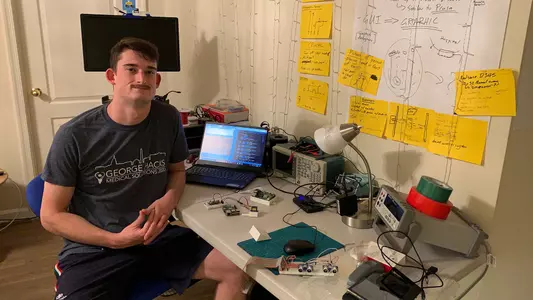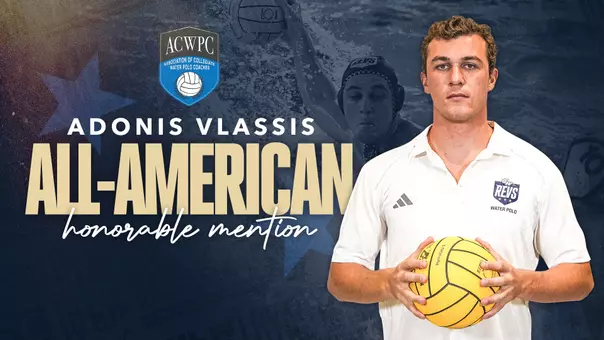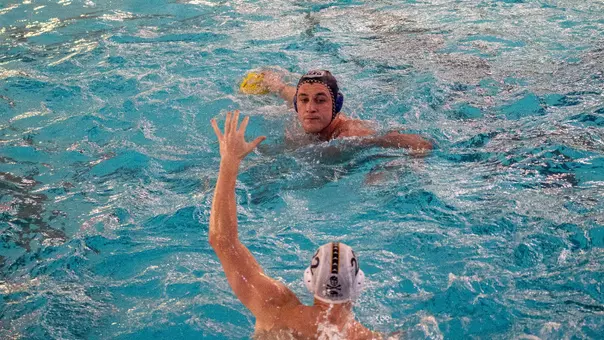George Washington University Athletics

Taylor Working to Help GW Hospital
4/13/2020 3:50:00 PM | Water Polo, My GW: Celebrating our Stories
Men's water polo goalkeeper is part of team creating touchless hospital screening system
Matt Taylor's apartment has been transformed.
Last month, the GW water polo graduate student was tabbed to be part of an interdisciplinary team of university students and faculty seeking to help GW Hospital design a safer and more efficient check-in process amid the COVID-19 pandemic.
With campus buildings set to close in an effort to curb the spread of the virus, Taylor, with help from his group, hurried to move high-tech prototyping equipment from the School of Engineering and Applied Science (SEAS) into his living room a few blocks from the hospital.
"I've got a full workshop running in my lounge right now," said Taylor, who is set to earn a master's degree in electrical engineering next month. "I've got oscilloscopes, multimeters, a bunch of computers, tool boxes, Dremel kits – just everything we thought we might need."
 The unique set-up has allowed round-the-clock work to continue on a touchless screening kiosk to help GW navigate the new challenges presented by COVID-19.
The unique set-up has allowed round-the-clock work to continue on a touchless screening kiosk to help GW navigate the new challenges presented by COVID-19.
The current system has nurses performing temperature checks and asking a base set of risk-assessment questions to every hospital visitor. The updated one will be able to streamline the process by collecting that data before admitting visitors or flagging them for further screening.
Taylor's team – spanning representatives from SEAS, GW Innovation Center and the Corcoran School of Arts & Design under the direction of David Lee and Carl Wick – has been busy building, testing and fine-tuning the system in recent weeks with hopes to launch within the next week.
Taylor's project also includes signage and a new plan for directing the flow of entrance/exit traffic to maximize social distancing. There's another group from SEAS that is working to utilize the 3D printers on campus to mass produce face shields and N95 respirator masks, as well.
"It's great to contribute to something like this," said Taylor, who was named to the All-MAWPC Championship First Team last fall in helping the Colonials reach the conference final. "I think everyone should be maintaining the best practices that are advised to us – social distancing, isolating, everything like that – but even when you are isolating by yourself what I've learned is there's still ways to contribute to this situation. Luckily, I found mine through an email from the dean of engineering."
The team members focused on the kiosk have been working together since March 17. The group also includes Konstantin Mitic, a former GW men's rower who is a graduate student studying biomedical engineering.
Despite a full academic load with four graduate courses and TA responsibilities for two other engineering classes, Taylor jumped at the chance to be involved.
"It was all pretty quick," Taylor said. "One day we were finding out that we weren't going to school (in person) anymore, and the next day I found out I'm in this group and we're trying to tackle a really, really important issue."
The project means trying to solve multiple challenges at the same time. They have worked to develop an infrared array thermometer that provides accuracy from a short distance away while also designing a touchless format to handle the Q-and-A portion of the screening.
The group has stayed in contact via daily video calls, only meeting in person to exchange materials or test at the hospital.
Taylor's proximity to the hospital has allowed him to be hands-on in the continued development of the system. The New Zealand native was part of a group that spent two hours in the reception area recently taking volunteers to test their progress.
The group found the kiosk to be close to ready, but the thermometer is still in need of calibration before roll out.
"It's real-time urgency," Taylor said. "They want this thing as soon as possible, but also there's a high risk to this."
A two-time All-Conference pick who wrapped his collegiate career No. 3 on GW's all-time saves list, Taylor has leaned on his experience with George Hacks, a student-run non-profit launched in 2018 that holds an annual "hackathon" competition in which teams have 24 hours to work toward a solution to a healthcare issue.
Yet, there are daily reminders that this is a test unlike anything he's taken on before, especially as the project aimed at aiding the fight against COVID-19 reaches its closing stretch.
"It's definitely a technical project, and we're getting more into the technical stuff as we're trying to make it more and more accurate," Taylor said. "In all my engineering projects, I've never been on something as significant and unique as this. There's so many things to learn from it."
Last month, the GW water polo graduate student was tabbed to be part of an interdisciplinary team of university students and faculty seeking to help GW Hospital design a safer and more efficient check-in process amid the COVID-19 pandemic.
With campus buildings set to close in an effort to curb the spread of the virus, Taylor, with help from his group, hurried to move high-tech prototyping equipment from the School of Engineering and Applied Science (SEAS) into his living room a few blocks from the hospital.
"I've got a full workshop running in my lounge right now," said Taylor, who is set to earn a master's degree in electrical engineering next month. "I've got oscilloscopes, multimeters, a bunch of computers, tool boxes, Dremel kits – just everything we thought we might need."

The current system has nurses performing temperature checks and asking a base set of risk-assessment questions to every hospital visitor. The updated one will be able to streamline the process by collecting that data before admitting visitors or flagging them for further screening.
Taylor's team – spanning representatives from SEAS, GW Innovation Center and the Corcoran School of Arts & Design under the direction of David Lee and Carl Wick – has been busy building, testing and fine-tuning the system in recent weeks with hopes to launch within the next week.
Taylor's project also includes signage and a new plan for directing the flow of entrance/exit traffic to maximize social distancing. There's another group from SEAS that is working to utilize the 3D printers on campus to mass produce face shields and N95 respirator masks, as well.
"It's great to contribute to something like this," said Taylor, who was named to the All-MAWPC Championship First Team last fall in helping the Colonials reach the conference final. "I think everyone should be maintaining the best practices that are advised to us – social distancing, isolating, everything like that – but even when you are isolating by yourself what I've learned is there's still ways to contribute to this situation. Luckily, I found mine through an email from the dean of engineering."
The team members focused on the kiosk have been working together since March 17. The group also includes Konstantin Mitic, a former GW men's rower who is a graduate student studying biomedical engineering.
Despite a full academic load with four graduate courses and TA responsibilities for two other engineering classes, Taylor jumped at the chance to be involved.
"It was all pretty quick," Taylor said. "One day we were finding out that we weren't going to school (in person) anymore, and the next day I found out I'm in this group and we're trying to tackle a really, really important issue."
The project means trying to solve multiple challenges at the same time. They have worked to develop an infrared array thermometer that provides accuracy from a short distance away while also designing a touchless format to handle the Q-and-A portion of the screening.
The group has stayed in contact via daily video calls, only meeting in person to exchange materials or test at the hospital.
Taylor's proximity to the hospital has allowed him to be hands-on in the continued development of the system. The New Zealand native was part of a group that spent two hours in the reception area recently taking volunteers to test their progress.
The group found the kiosk to be close to ready, but the thermometer is still in need of calibration before roll out.
"It's real-time urgency," Taylor said. "They want this thing as soon as possible, but also there's a high risk to this."
A two-time All-Conference pick who wrapped his collegiate career No. 3 on GW's all-time saves list, Taylor has leaned on his experience with George Hacks, a student-run non-profit launched in 2018 that holds an annual "hackathon" competition in which teams have 24 hours to work toward a solution to a healthcare issue.
Yet, there are daily reminders that this is a test unlike anything he's taken on before, especially as the project aimed at aiding the fight against COVID-19 reaches its closing stretch.
"It's definitely a technical project, and we're getting more into the technical stuff as we're trying to make it more and more accurate," Taylor said. "In all my engineering projects, I've never been on something as significant and unique as this. There's so many things to learn from it."
Players Mentioned
GW MBB vs Richmond (Post-Game Press Conference)
Sunday, January 25
GW Men's Basketball vs. George Mason (Post-Game Press Conference)
Tuesday, January 20
GW Men's Basketball vs. Davidson (Post-Game Press Conference)
Thursday, January 15
RAISE HIGH AT GW: S6 EP7
Monday, January 12













